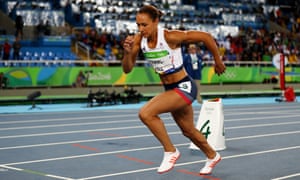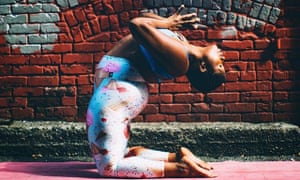Why has women’s fitness become a beauty contest? | Anna Kessel
Being a female Olympian must be a confusing experience. You win a gold medal, you wow the world with your athleticism and sporting talent, you make history … and all anyone can talk about is your make-up, your marital status, or your hair. In 2016 we may finally have woken up to the infuriating daily inequalities facing sportswomen, but it is damning that so much superficial nonsense remains in the rhetoric that surrounds their success.
We should be in awe of what these sportswomen do and say, not harping on about what they look like. When Simone Manuel won gold in the pool, and spoke out about Black Lives Matter, she wasn’t doing it so that people could have an opinion about her hair. When Jessica Ennis-Hill ran her guts out in the 800m for a heptathlon silver medal, she wasn’t thinking about showing off her abdominals. When Egypt’s Nada Meawad and Doaa Elghobashy made their Olympic debut in beach volleyball, they weren’t weighing up how their outfits looked compared with their bikini-clad rivals.

Neither should we be. If I see one more editorial about a sportswoman’s outfit, or make-up, or how to get abs like an Olympian, I will throw up. Professional sport should be about the struggle to reach the pinnacle of your abilities, to stretch yourself, to win. These women put their bodies on the line, and use their platform to make bold political statements; it can’t be right that all we can think about is how to achieve greater butt lift.
Because with the explosion of fitness for women has come a new preoccupation with our bodies: the quest for muscle – also known as “fitspo”. It’s all delivered under the banner of being good for you, buoyed by the now ubiquitous slogan: strong is the new skinny. But if strong really is the new skinny, then why do the #Fitspo and #SheSquats images show us flat stomachs? Is “strong” just “skinny” rebranded? And why does it all come loaded with this weird front-facing pressure? By its very nature, fitspo wants you to show your muscle off: to tweet it, Instagram it, Facebook it, Snapchat it. Women, once again, are being put on display.
What is so pernicious about this movement is that feeling bad about our bodies is being dressed up as female emancipation, wrapped up in the idea of self-control. If you want to look good, you just have to work harder. You’ll feel pain now, but you will feel great tomorrow. Look at her! Do you think she just woke up like this? No! She sweated in the gym. (Remember, ladies, “sweat is just fat crying”.)
If you said any of this out loud, to a friend, you’d probably both have an attack of the giggles. But somehow, in the private glow of the laptop, or phone, these images hold sway over us. Why? Because the messages are so familiar. We’ve been hearing them our whole lives in the language of the diet industry. We already know that we should suffer for our bodies to look right; we already know that we should critique, and pick, and compare, and judge, and measure, and ultimately feel dissatisfied. This is our zone.
Depressingly, it’s fast becoming the case for men too. Reggie Yates’s BBC documentary, Dying for a Six Pack, broadcast earlier this year, brought tears to my eyes as I watched young men risk their lives, waste their bank balances, and ultimately damage their own mental health – all in the pursuit of the right shaped abdominal stack. Which, inevitably, never materialised. Because all our bodies are different and we won’t all get six packs, even if we work out in a sauna, on steroids, with our gut wrapped in cling film. The narrative was so eye-gougingly familiar I wanted to shout in despair at the TV.
Rather than “strong” paving the way to female liberation, it all just smacks of new pressures to look a certain way, to conform to a new body trend. Skinny was bad enough, but now we need a six pack and a tight booty that looks like it’s been implanted with beachballs. Plenty of sports at least offer the possibility of inclusivity – but this exercise trend feels entirely elitist. It’s expensive, it involves tight-fitting lycra and revealing crop-top outfits: just how many women are we further alienating in an already alienated section of the population?
Some will argue, inevitably, that fitspo is an improvement on what went before: a necessity, even. We have an obesity crisis, society is less active than ever, gyms and hot yoga being cool are good things – right? And not all media outlets are to blame. At the turn of the year the US editor at Women’s Health announced a ban on some of the worst phrases that have traditionally graced its covers – including “diet”, “shrink”, “drop two sizes”, and “bikini body”. Good for them. But until we stop polarising these issues – from obesity to fitspo – profiling the extremes as though it’s only one option or the other, will we ever truly find a healthy space to live in?
So why do we insist on perpetuating this punitive approach? Why are physical goals so deeply attached to attaining a certain type of body image? Why is all this stuff so emotionally loaded with unhappiness? I want women to be physically active because it feels good, because it is something enjoyable they can do with their friends, their partners and their children, or because it provides a quiet space to be on their own.
I want more women to be inspired by the likes of Jessamyn Stanley, an African American woman living in North Carolina who posts beautiful photographs of her body in exquisite yoga poses that mainstream media would lead you to believe were not possible for a woman of her shape and size.

I want to shout about the £2.50 family fitness classes at my local Salvation Army, or the clubbing exercise classes at a community centre down the road, I want women spreading the word about exercise that makes them feel great –through the menopause, dementia and period pains.
With the final note of the Olympic closing ceremony having played last night, our biggest takeaway from these two weeks of incredible sport should be about female sporting achievement and how it connects to our own lives. If we want to move forward as a society we’ve got to stop obsessing over women’s bodies.
Sport is supposed to be fun – that’s the point – and it is supposed to be liberating. In 1896 the American civil rights leader Susan B Anthony wrote: “Let me tell you what I think of bicycling. I think it has done more to emancipate women than any one thing in the world. I rejoice every time I see a woman ride by on a bike. It gives her a feeling of self-reliance and independence the moment she takes her seat; and away she goes, the picture of untrammelled womanhood.”
Sport should move us further away from thoughts about how we are supposed to look, not chain us into a lifetime of butt-taming burpees.
• Anna Kessel is the author of Eat Sweat Play
Source: Read Full Article


